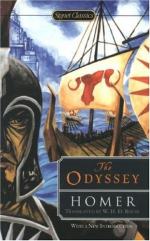According to this document, the city of Cumae in AEolia was, at an early period, the seat of frequent immigrations from various parts of Greece. Among the immigrants was Menapolus, the son of Ithagenes. Although poor, he married, and the result of the union was a girl named Critheis. The girl was left an orphan at an early age, under the guardianship of Cleanax, of Argos. It is to the indiscretion of this maiden that we “are indebted for so much happiness.” Homer was the first fruit of her juvenile frailty, and received the name of Melesigenes from having been born near the river Meles in Boeotia, whither Critheis had been transported in order to save her reputation.
“At this time,” continues our narrative, “there lived at Smyrna a man named Phemius, a teacher of literature and music, who, not being married, engaged Critheis to manage his household, and spin the flax he received as the price of his scholastic labours. So satisfactory was her performance of this task, and so modest her conduct, that he made proposals of marriage, declaring himself, as a further inducement, willing to adopt her son, who, he asserted, would become a clever man, if he were carefully brought up.”
They were married; careful cultivation ripened the talents which nature had bestowed, and Melesigenes soon surpassed his schoolfellows in every attainment, and, when older, rivalled his preceptor in wisdom. Phemius died, leaving him sole heir to his property, and his mother soon followed. Melesigenes carried on his adopted father’s school with great success, exciting the admiration not only of the inhabitants of Smyrna, but also of the strangers whom the trade carried on there, especially in the exportation of corn, attracted to that city. Among these visitors, one Mentes, from Leucadia, the modern Santa Maura, who evinced a knowledge and intelligence rarely found in those times, persuaded Melesigenes to close his school, and accompany him on his travels. He promised not only to pay his expenses, but to furnish him with a further stipend, urging, that, “While he was yet young, it was fitting that he should see with his own eyes the countries and cities which might hereafter be the subjects of his discourses.” Melesigenes consented, and set out with his patron, “examining all the curiosities of the countries they visited, and informing himself of everything by interrogating those whom he met.” We may also suppose, that he wrote memoirs of all that he deemed worthy of preservation. Having set sail from Tyrrhenia and Iberia, they reached Ithaca. Here Melesigenes, who had already suffered in his eyes, became much worse; and Mentes, who was about to leave for Leucadia, left him to the medical superintendence of a friend of his, named Mentor, the son of Alcinor. Under his hospitable and intelligent host, Melesigenes rapidly became acquainted with the legends respecting Ulysses, which afterwards formed the subject of the Odyssey. The inhabitants of Ithaca assert, that it was here that Melesigenes became blind, but the Colophonians make their city the seat of that misfortune. He then returned to Smyrna, where he applied himself to the study of poetry.




